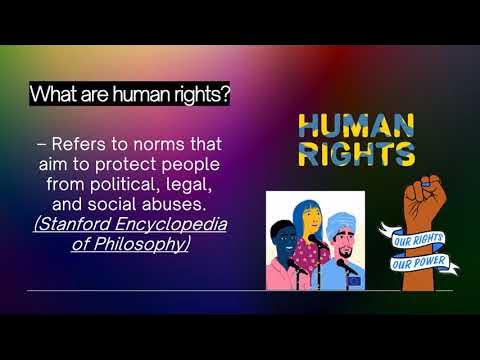Bata-lakayan Ep. 2: Anti-Child Marriage Law
Summary
TLDRThe video script addresses the critical issue of child marriage in the Philippines, particularly in the Bangsamoro region. It highlights the connection between child marriage and socio-economic vulnerabilities, with 15% of Filipino girls marrying before 18. The Philippines has enacted a law to criminalize child marriage, but challenges remain in its implementation, especially concerning Muslim and Indigenous communities. The script emphasizes the need for dialogue, legal reforms, and social norm changes to protect children's rights and end this harmful practice.
Takeaways
- 🌏 The Philippines ranks 12th globally in the number of child marriages, with approximately 726,000 children married before turning 18 in 2017.
- 👧 15% of Filipino girls are married before the age of 18, with 2% marrying before they turn 15, indicating one in six Filipino girls are married as children.
- 📉 Despite a decline in prevalence, child marriage remains a significant issue, particularly among marginalized and Indigenous communities in the Philippines.
- 🏛️ The Bangsamoro Autonomous Region in Muslim Mindanao (BARMM) faces unique challenges, with over half of its 3.8 million population experiencing multi-layered discrimination.
- 💔 Poverty is a key driver of child marriage in the BARMM, with 62% of women belonging to poor families, exacerbating vulnerabilities to abuse and violence.
- 🚫 Republic Act No. 11596, passed in 2021, prohibits child marriage and imposes penalties for violations, effectively criminalizing the practice in the Philippines.
- 🏢 The law aims to abolish traditional practices and structures that perpetuate child exploitation and to ensure marriage is entered into only with the free and full consent of both parties.
- ⏰ There is a one-year suspension of the law's implementation for Muslim Filipinos and Indigenous peoples to ensure full compliance through extensive measures and programs.
- 🤝 Dialogues with Muslim and Indigenous communities are crucial for addressing contentions and ensuring the law respects religious and cultural diversity.
- 🔄 The law has sparked debates, particularly concerning its compatibility with Muslim personal laws (PD 1083) and the need for inclusive legislation that considers the perspectives of affected communities.
Q & A
What is the main topic discussed in the video script?
-The main topic discussed in the video script is the problem of child marriage in the Philippines, specifically in the Bangsamoro region, and the efforts to end this practice.
What is the global prevalence of child marriage, according to the script?
-Child marriage is a worldwide issue, and while its prevalence is in decline, it remains common in different parts of the world.
What is the Philippines' ranking in terms of the absolute number of child marriages globally?
-According to the script, the Philippines ranks 12th in the absolute number of child marriages globally.
What percentage of Filipino girls were married before the age of 18, as mentioned in the script?
-15 percent of Filipino girls were married before the age of 18.
What is the Bangsamoro Autonomous Region, as referred to in the script?
-The Bangsamoro Autonomous Region is a new entity established through a law, with a population of 3.8 million, where Muslim women continue to face multi-layered discrimination.
What percentage of women in the Bangsamoro belong to poor families, as stated in the script?
-62 percent of women in the Bangsamoro belong to poor families.
What law was passed in the Philippines in December 2021 to address child marriage?
-Republic Act number 11596 was passed in December 2021, which prohibits the practice of child marriage and imposes penalties for violations.
What are the key policies sought to be implemented by the Philippine government as per the new law on child marriage?
-The key policies include abolishing traditional and cultural practices that perpetuate discrimination, abuse, and exploitation of children, and ensuring marriage is entered into only with the free and full consent of capacitated parties.
What are the unlawful acts under the new law that pertain to child marriage?
-The unlawful acts under the new law include facilitation of child marriage, solemnization of child marriage, and cohabitation of an adult with a child outside of wedlock.
What is the legal effect of child marriage once the new law is implemented?
-Child marriage is considered void from the beginning, as if there was no marriage at all, and the action and defense for the declaration of absolute nullity will not prescribe.
What are the issues raised by Muslim communities regarding the new law on child marriage?
-The issues raised include the contention that the law contradicts the beliefs of Muslim communities and established Sharia principles, questions on religious freedom and constitutionality, and concerns about the law's application to Muslim Filipinos.
What is the age of marriage for girls under Presidential Decree 1083, as mentioned in the script?
-Under Presidential Decree 1083, the age of marriage for girls is when they reach puberty, which can be as young as nine years old.
Outlines

Esta sección está disponible solo para usuarios con suscripción. Por favor, mejora tu plan para acceder a esta parte.
Mejorar ahoraMindmap

Esta sección está disponible solo para usuarios con suscripción. Por favor, mejora tu plan para acceder a esta parte.
Mejorar ahoraKeywords

Esta sección está disponible solo para usuarios con suscripción. Por favor, mejora tu plan para acceder a esta parte.
Mejorar ahoraHighlights

Esta sección está disponible solo para usuarios con suscripción. Por favor, mejora tu plan para acceder a esta parte.
Mejorar ahoraTranscripts

Esta sección está disponible solo para usuarios con suscripción. Por favor, mejora tu plan para acceder a esta parte.
Mejorar ahoraVer Más Videos Relacionados
5.0 / 5 (0 votes)






